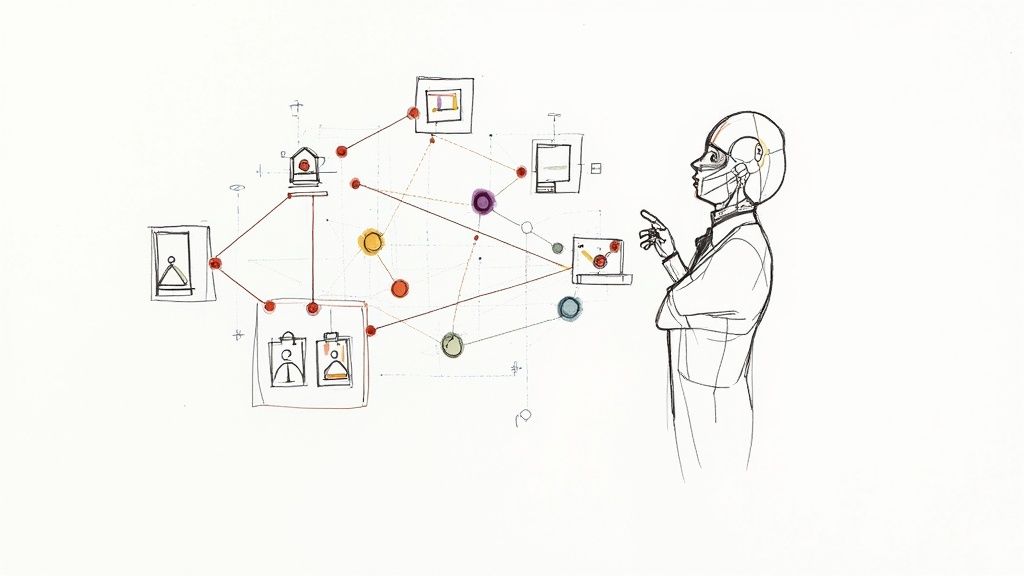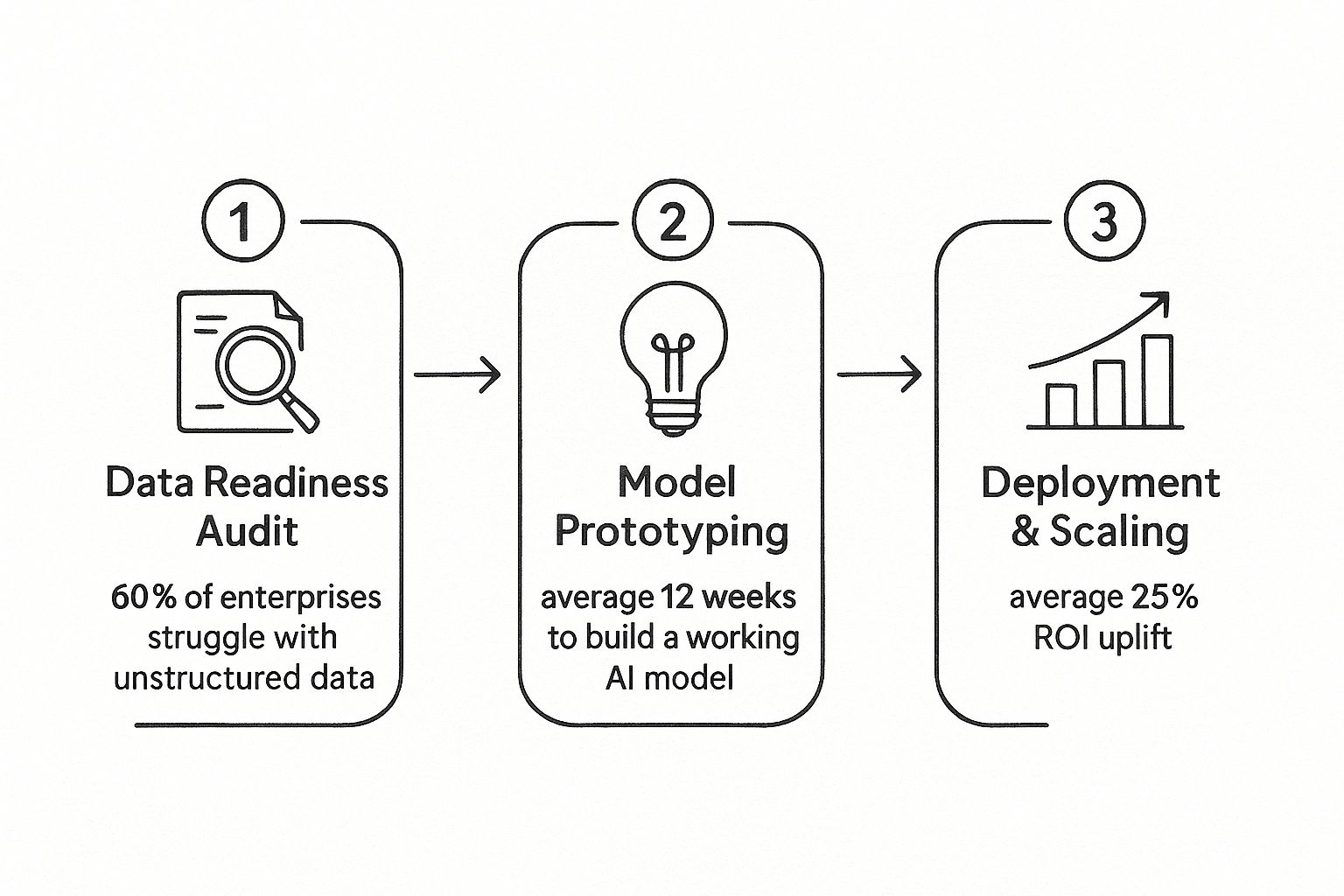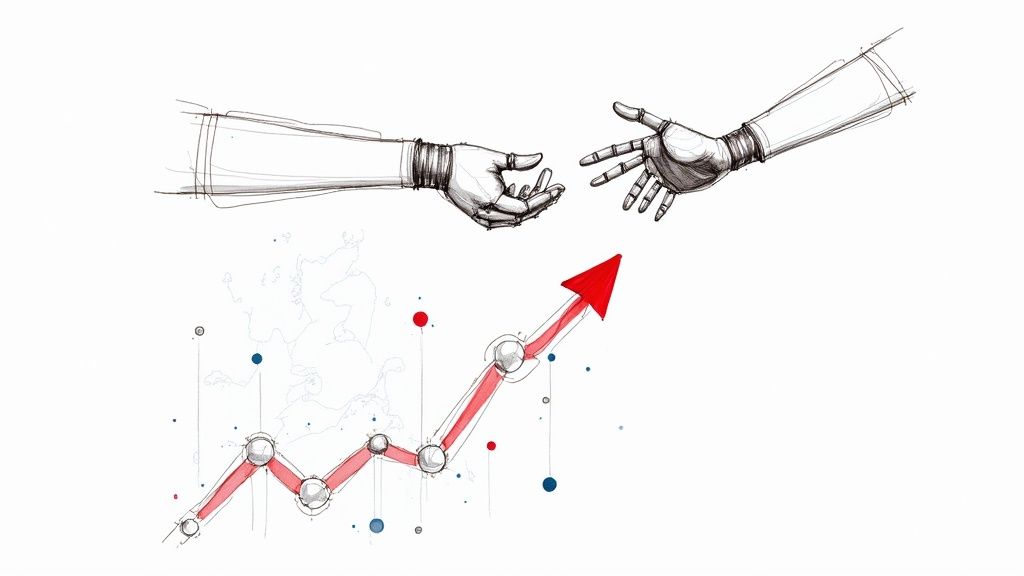AI Transformation Consulting for Business Growth
Unlock business growth with expert AI transformation consulting. Learn how to build a winning strategy, navigate challenges, and drive real-world results.

For most German businesses, Artificial Intelligence isn't just a new gadget on the block anymore. It's become a fundamental part of staying afloat and getting ahead. The change has been massive: AI has gone from a specialised tool for the tech-savvy to a core part of business strategy, all thanks to the relentless pressure to work smarter, outpace the competition, and find new ways to make money.
This isn't just another IT project; it's a root-and-branch evolution of the business itself.
Why AI Transformation Is a Business Imperative
The chatter around AI has shifted from boardroom theory to real-world action with budgets to back it up. Companies aren't asking if they should get on board with AI anymore. Now, the question is how fast they can weave it into their operations to secure a competitive advantage. This urgency is easy to spot in the soaring investments and strategic planning happening across every industry.
Recent data really brings this shift into focus. By mid-2025, a massive 91% of German companies view generative AI as crucial to their business model and future success. That’s a huge leap from just 55% the year before. On top of that, 82% of these organisations are set to increase their AI budgets, with over half planning to boost spending by at least 40%. It’s a clear signal that AI has arrived as a business-critical priority. You can explore the full findings on German AI adoption at kpmg.com.
The Core Drivers of AI Adoption
 So, what’s fuelling this rush? It really comes down to clear, tangible results that leaders can see and measure. This isn’t about adopting technology for technology's sake; it’s about solving real-world business challenges.
So, what’s fuelling this rush? It really comes down to clear, tangible results that leaders can see and measure. This isn’t about adopting technology for technology's sake; it’s about solving real-world business challenges.
The table below breaks down the primary motivations compelling German companies to invest in AI transformation, connecting each driver to its strategic impact.
Key Drivers for AI Transformation in German Businesses
Business Driver | Description | Strategic Impact |
|---|---|---|
Enhanced Innovation | AI speeds up research and development cycles, allowing companies to design and launch new products and services far more quickly. | Secures a first-mover advantage and helps businesses stand out in saturated markets. |
Operational Efficiency | Automating routine tasks and fine-tuning complex processes frees up employees to concentrate on creative, strategic work. | Directly boosts productivity, reduces operational costs, and improves the bottom line. |
Sales and Revenue Growth | AI delivers deep insights into customer behaviour, helping to pinpoint new market opportunities and personalise sales approaches. | Leads to more accurate sales forecasting, stronger customer relationships, and increased revenue. |
These drivers show that the push for AI is grounded in practical business needs, from improving internal processes to creating entirely new sources of income.
True AI transformation is about fundamentally reshaping how a business operates, competes, and creates value. It requires a holistic view that aligns technology with core strategic goals.
Getting from an idea to actual results takes more than just sophisticated software; it demands a strategic partnership. A hands-on approach like AI co creation is vital for navigating the twists and turns of this evolution. It ensures that every step, from the first brainstorm to the final rollout, is built on a solid business case. This sets the stage for a practical, strategy-first path to achieving outcomes you can actually measure.
As we'll explore, expert AI transformation consulting is what provides the roadmap for this critical journey.
What AI Transformation Consulting Actually Means

Let's cut through the buzzwords and talk about what AI transformation consulting really is. Think of it like building a custom, high-tech corporate headquarters. You wouldn’t just hire an electrician to wire up the building; you'd bring in an architect and a construction manager to design the blueprint and oversee the entire project from start to finish.
An AI consultant plays that exact role for your business. They aren't just there to install a piece of software or tweak an algorithm. They're your strategic partner, designing the AI blueprint (your strategy), sourcing the best materials (the right technologies), and managing the entire construction (implementation). Their job is to make sure the final result is secure, scalable, and perfectly aligned with where your business is headed. You can use an AI Strategy consulting tool to streamline this process.
This is a world away from standard IT support or one-off tech fixes. It’s a holistic approach, focused squarely on creating long-term business value.
More Than a Tech Fix
True AI strategy consulting isn't about slapping a temporary tech solution onto an isolated problem. It’s about weaving AI into the very fabric of your organisation to drive real, sustainable growth and build a competitive advantage that lasts.
This means consultants do a lot more than just the technical work. Their role includes:
Finding the Gold: They work alongside your leadership to pinpoint the biggest opportunities—those high-value areas where AI can solve a critical business challenge or open up entirely new revenue streams.
Navigating the Risks: From the very beginning, they’re looking out for potential pitfalls. Think data privacy issues, algorithmic bias, or tricky integration challenges. They build a solid framework to manage these risks before they become problems.
Managing the Human Side: A successful AI shift is as much about people as it is about technology. Consultants help prepare your teams, build new skills, and foster a culture that embraces change and continuous learning.
This structured approach is often the key difference between a successful AI transformation and a costly, failed experiment.
From Blueprint to Business Impact
At the end of the day, AI transformation consulting is all about delivering measurable business outcomes. A recent IDC study highlighted this, finding that for every $1 an organisation invests in generative AI, it sees an average return of $3.70. That kind of ROI doesn't just happen by accident.
AI transformation consulting bridges the gap between technological possibility and tangible business value. It's about co-creating a future where AI isn't just a tool, but a core driver of your company's success.
It’s achieved through a disciplined process that ties every single action back to your strategic goals. The consultant acts as your guide, ensuring the technology serves the business, not the other way around. This involves a deep dive into your current processes, workflows, and market position to find that perfect fit.
The whole process is intensely collaborative, ensuring the final solutions are not only technically sound but are also fully adopted by your teams and suited to your unique operational realities. This partnership is what turns a powerful technology into a genuine business asset.
Your Step-by-Step AI Transformation Journey
Jumping into a full-scale AI transformation is a major move, but it doesn’t have to feel like a leap of faith. With the right guidance from AI transformation consulting, this huge undertaking becomes a clear, structured journey. This roadmap turns a complex ambition into a series of manageable phases, making sure every step you take is deliberate, measurable, and tied directly to what you want to achieve as a business.
The whole point is to build momentum. You start with a solid foundation and then build up towards full-scale implementation and ongoing improvement. It's a bit like constructing a high-rise building: you have to do the deep, foundational work before you can start adding floors. Each stage has its own clear purpose, deliverables, and ways to measure success.
Phase 1: Discovery and Strategy Formulation
Every journey starts with discovery. This first phase is all about getting everyone on the same page and understanding the landscape. Here, consultants sit down with your leadership team to talk not about technology, but about your business. We dig into your challenges, your biggest goals, and the specific results you need to see.
This usually involves some deep-dive sessions to map out how your operations currently work, often including a thorough AI requirements analysis. The main goal here is to pinpoint the high-impact opportunities where AI can deliver the biggest bang for your buck—whether that’s through cutting costs, creating new revenue, or just making things run more smoothly.
Phase 2: Use Case Definition and Pilot Projects
Once you have a strategy, it’s time to make it real. This phase is where we translate those broad goals into specific, concrete projects. It's about figuring out which ideas have the most promise and then testing them out on a small scale.
We start by identifying the most promising use cases and then launch a pilot project. Think of pilots as small, controlled experiments. They’re designed to test if an idea works and to show its value without a massive upfront investment.
A successful pilot does more than just prove a concept—it builds real momentum and gets key people across the company excited and on board. That makes it much easier to secure support for bigger projects down the line.
At Ekipa, we've found that a well-run pilot can be the single most important factor in getting an AI initiative off the ground. It turns an abstract idea into something tangible that people can see and understand.
Phase 3: Scaling, Implementation, and Optimisation
When a pilot project succeeds and shows a clear return, the next logical step is to scale it up. This means rolling out the proven solution across the right departments or even the entire organisation. This stage is about more than just flipping a switch on the technology; it demands careful change management, training your teams, and integrating the new system into your existing ways of working to ensure it’s adopted smoothly.
This process flow shows how the key stages connect, from initial readiness checks to final deployment.

As you can see, many companies struggle with getting their data ready, but those who successfully navigate the prototyping and deployment phases see a significant average ROI uplift of 25%.
But the journey doesn’t stop once the system is live. A true AI transformation is a continuous cycle of improvement and optimisation.
Ongoing Monitoring: We constantly track how the AI models are performing to make sure they're delivering the results you expect.
Model Refinement: AI models need to be updated and retrained with new data to stay accurate and adapt as your business changes.
Exploring New Opportunities: The insights from your first projects will almost certainly spark new ideas. We help you spot these new opportunities and drive further innovation.
This iterative loop ensures your AI capabilities grow and evolve right alongside your business, delivering real, lasting value. Ready to see how this process could work for you? Our AI Strategy Workshop is the perfect first step to map out your unique journey.
Overcoming Common AI Adoption Hurdles

Starting an AI transformation journey is exciting, but let's be honest—it’s rarely a straight line from idea to impact. For many German businesses, the path is often dotted with very real, practical challenges that can stall progress. Recognising these hurdles is the first step, but having a clear plan to navigate them is what truly separates a successful initiative from a forgotten one.
These obstacles—things like investment gaps, messy data, and a shortage of skilled people—are precisely why businesses bring in an expert in AI transformation consulting. Rather than viewing these as dead ends, it’s far more productive to see them as predictable bumps in the road. A good consultant helps you anticipate and manage them, turning potential setbacks into opportunities to build a stronger, more resilient organisation.
The Data Dilemma and Skills Shortage
One of the first brick walls many companies hit is the state of their data. AI models are hungry, and they need a diet of high-quality, well-structured data to perform. The reality? Most organisations find their data is siloed, inconsistent, or just not enough for what they want to achieve. This data bottleneck can stop a promising AI project in its tracks.
Right alongside the data problem is a very human one: a widespread talent shortage. There’s a noticeable gap in the market for people with deep, specialised AI skills. This leaves many businesses feeling stuck, unsure of who they need to hire or what expertise is truly required, which often leads to project delays.
"A common pitfall is underestimating the groundwork. Success in AI isn't just about advanced algorithms; it's built on a foundation of clean data, clear governance, and a workforce prepared for change."
This is where a structured, expert-led approach makes all the difference. A consultant can help you get the fundamentals right by:
Conducting a data readiness audit: Taking a hard, honest look at the quality, accessibility, and governance of your current data assets.
Developing a robust data strategy: Building a clear roadmap to clean, centralise, and enrich your data so it becomes a genuine asset for AI.
Implementing upskilling programmes: Designing targeted training to give your existing teams the skills they need, which helps build an internal culture of innovation. As we explored in our AI adoption guide, developing in-house capabilities is a game-changer for long-term success.
Navigating Investment and Ethical Complexities
Even with strong government support, German companies often find themselves in a tough spot when it comes to investment, especially when compared to global tech giants. Germany's High-Tech Strategy 2025 shows a clear commitment, allocating significant funds to R&D. But the private investment needed for large-scale enterprise AI can still be a major hurdle, requiring a rock-solid business case to get the budget approved. You can read more about Germany's strategic AI approach and its challenges on linvelo.com.
Ethical questions also cast a long shadow. Issues around algorithmic bias, "black box" decision-making, and data privacy aren't just about compliance; they strike at the heart of customer and employee trust. Without a strong governance framework, companies risk damaging their reputation and seeing their AI systems fail because people simply won't use them.
A Consultant’s Playbook for Success
An experienced AI consulting partner brings a clear playbook to the table. They help de-risk your investment by identifying and focusing on projects with the highest and fastest potential for a solid return.
This typically involves:
Building a watertight business case: Clearly articulating the financial and strategic upside to secure the necessary funding and leadership buy-in.
Establishing an ethical AI framework: Putting governance policies, audit processes, and transparency measures in place to ensure AI is used responsibly.
Managing compliance and operational costs: Carefully planning the move from a pilot project to full-scale adoption to avoid budget blowouts and nasty surprises.
By tackling these hurdles proactively, an AI consultant turns potential obstacles into stepping stones, building confidence across the organisation and ensuring your transformation journey delivers real, lasting value.
How to Choose the Right AI Consulting Partner
The success of your entire AI initiative really boils down to one make-or-break decision: picking the right partner. This isn’t about hiring a vendor to just plug in some software. Think of it more like finding an experienced guide for a complex expedition—someone who understands the terrain, anticipates the pitfalls, and knows how to navigate the technical, strategic, and human challenges of real organisational change.
Your choice here is what separates a genuine business breakthrough from a very expensive detour. You need to look past the slick presentations and find a partner who brings a potent mix of deep industry knowledge, a clear and open process, and a real commitment to working with you, not just for you.
Deep Industry and Technical Expertise
First things first: your partner absolutely must understand your world. A one-size-fits-all approach to AI transformation consulting is a recipe for disaster. You need a team with a track record in your specific industry, whether that's manufacturing, healthcare, or finance. They should be able to speak your language and immediately grasp your unique challenges and opportunities.
Of course, that industry insight needs to be paired with serious technical muscle. A top-tier consultant has to be fluent in the major AI platforms and tools. They need the hands-on expertise not just to recommend the right technology, but to actually build, deploy, and weave it into the fabric of your existing systems.
A Proven and Transparent Methodology
A great consultant doesn't operate from a "black box." They should have a clear, repeatable process and be happy to walk you through it, step-by-step. Ask them to show you how they get from an initial discovery session to a working strategy, then to pilot projects, and finally to a full-scale rollout.
This is where their tools and frameworks really show their value. For example, a potential partner ought to be able to show you their AI strategy framework and explain exactly how it connects every action back to your core business goals. Transparency is everything. You should always feel like you know what’s happening, why it’s happening, and what’s coming next.
The best partnerships are built on a foundation of shared understanding and mutual trust. Your consultant should feel like an extension of your own team, invested in your success.
This collaborative spirit is the heart of what’s known as AI co creation, where the consultant and client build solutions together. It's the only way to ensure the final product is not only technically solid but also genuinely embraced by your people.
Checklist for Selecting Your AI Transformation Partner
Use these criteria to evaluate and select the ideal consulting partner for your AI journey.
Evaluation Criterion | What to Look For | Why It Matters for Your Success |
|---|---|---|
Industry Expertise | Demonstrable experience and successful real-world use cases within your specific sector. | They will understand your unique challenges and opportunities, leading to more effective and relevant solutions. |
Technical Proficiency | Deep knowledge of current AI platforms, tools, and ethical AI principles. | Ensures they can build robust, secure, and responsible solutions that integrate with your existing infrastructure. |
Collaborative Approach | A focus on partnership, knowledge transfer, and upskilling your internal teams. | Builds your organisation's long-term AI capabilities, reducing dependency and fostering a culture of innovation. |
Proven Methodology | A transparent, structured process with clear deliverables and milestones at each stage. | Provides a reliable roadmap for your transformation, minimising risk and ensuring predictable, measurable outcomes. |
In the end, choosing the right partner is about finding a team that marries big-picture strategic thinking with on-the-ground, practical execution. This selection process is your first critical step in AI transformation consulting. By carefully weighing these factors and speaking with our expert team, you can find a partner who will do more than just deliver technology—they will empower your business to thrive in the age of AI.
The Future of AI and Business Integration
If you look at the horizon of AI and business, you'll see it's not just evolving—it's shifting into an entirely new era of intelligent, proactive systems. The key to staying ahead is realising that AI transformation isn't a one-and-done project. It’s a continuous journey. The technology just around the corner will make today’s innovations seem like the warm-up act.
Two massive shifts are starting to take shape: agentic AI and hyper-personalisation. Think about autonomous AI systems, or "agents," that do more than just follow commands. Imagine them independently managing complex, multi-step workflows across your entire organisation. This is what agentic AI promises—a future where digital workers handle everything from supply chain logistics to customer service escalations without needing a human to constantly check in.
Emerging Opportunities for German Industries
These advancements are poised to open up huge opportunities, especially for Germany's core industries like manufacturing, healthcare, and logistics. In manufacturing, you could see agentic AI autonomously optimising production lines in real time, predicting maintenance needs, and managing inventory with a level of precision we can only dream of today.
The impact on healthcare could be even greater. AI-driven systems are on track to slash administrative workloads and dramatically improve diagnostic accuracy by analysing colossal amounts of medical data—a trend that’s already picking up steam.
The next wave of AI will move beyond simple task automation to full workflow ownership. The focus is shifting from tools that assist people to autonomous agents that execute entire business processes, unlocking a whole new level of efficiency.
This isn't just theory; it's quickly becoming a core piece of Germany's economic strategy. In 2025, the German market for AI transformation consulting is set to grow significantly, fuelled by specialised AI solutions and deeptech innovations. Forecasts point to a rising demand for expert guidance as companies work to embed sophisticated AI into their core operations, with agentic AI at the forefront of this efficiency revolution. The healthcare sector, in particular, is expected to see huge benefits from AI tools that simplify administration and enhance diagnostics. You can read more predictions for German tech in 2025 on bebeez.eu.
Building for Tomorrow, Not Just Today
Keeping an eye on these future trends is absolutely crucial for making smart decisions right now. If you take a reactive approach—only fixing today's problems—you'll always be playing catch-up. Real AI transformation consulting is about building for what’s next, making sure the strategies and systems you put in place today are scalable and ready for the next wave of innovation.
This forward-looking mindset is central to how we operate. We help clients discover and build impactful, real-world use cases that are designed to be future-proof from the start. By anticipating the rise of technologies like agentic AI, we make sure your transformation journey doesn’t just solve today's issues but also positions you to lead in the intelligent, automated business world of tomorrow.
This journey is a constant cycle of discovery, implementation, and evolution. To navigate it well, you need more than a provider—you need a strategic partner. Our expert team is here to guide you through every stage, ensuring you’re always ready for what's next.
Frequently Asked Questions
It’s completely normal to have questions when you're thinking about something as significant as AI transformation. Smart business leaders want to know about timelines, returns, and what it takes from their team. Let’s get into some of the most common questions we hear.
We've provided some straightforward answers here to give you a clearer picture. For an even deeper dive, feel free to check out our complete AI transformation FAQ page.
What Is the Typical ROI on an AI Transformation Project?
The return on investment (ROI) for an AI project really depends on what you're trying to achieve and in which industry. The results almost always fall into one of three buckets: saving money, making more money, or reducing risk.
For instance, automating tedious administrative tasks can directly save costs by freeing up thousands of employee hours. On the flip side, using AI to give customers a more personalised experience can boost sales and open up entirely new revenue channels. A good consultant won't just talk about possibilities; they'll help you build a solid business case with clear financial projections before you invest a single euro, making sure every project is tied to real business value from the get-go.
How Long Does an AI Transformation Take?
This isn't some endless, multi-year saga. The initial strategy and pilot phase can often be wrapped up in just three to six months. In that time, the goal is to pinpoint the best opportunities and launch a small-scale pilot to prove the concept works and can deliver real value, fast.
Rolling out AI across the entire organisation is more of an ongoing journey, but you should expect to see tangible results from those initial pilots within the first year. The modern approach to AI transformation consulting is all about agile, iterative progress. It’s about building momentum and delivering value step-by-step, not waiting for a single, massive launch day.
Do We Need a Team of Data Scientists to Start?
Absolutely not. This is one of the biggest myths that stops businesses from even getting started. A key part of an expert AI transformation consultant’s job is to fill that initial talent gap, bringing the technical firepower you need right from the beginning.
A key goal of a great consulting partnership is not just to deliver a solution, but to build your internal capabilities over time. This reduces long-term dependency and fosters a self-sustaining culture of innovation.
The best consultants don’t work in a silo; they work right alongside your team. This co-creation model means they are constantly sharing knowledge and providing hands-on training. By the time the project is implemented, your own people have the skills and confidence to manage, maintain, and even expand on it, turning your company into a self-sufficient AI leader.
Ready to move from questions to action? Ekipa AI provides a next-generation consulting platform that delivers a tailored AI strategy in just 24 hours. We turn your ideas into scalable impact, fast. Meet our expert team to see how we can help.



